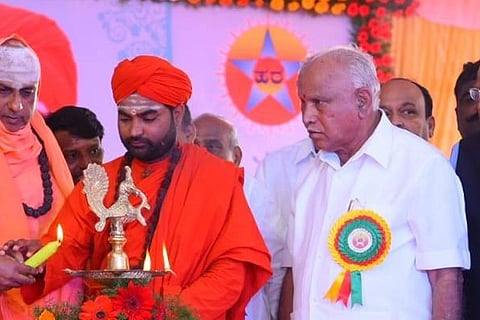

The January 14 public spat between Karnataka Chief Minister BS Yediyurappa and Panchamasali (sub-sect of Lingayat community) Gurupeetha seer Vachanananda swami over giving cabinet berths to the community has evoked mixed response in political and spiritual circles. But this public quarrel is a pointer to the interdependence of the two over the years.
The influence of mutts on Karnataka politics dates back to the 1960s, when then sitting Chief Minister S Nijalingappa, representing the Banajiga sub-sect of the Lingayat community, was defeated from Hosadurga constituency in Chitradurga district. The reason was rivalry with the local, influential Sirigere mutt seer representing Sadar, another Lingayat sub-sect, who ensured a Kuruba got elected. Nijalingappa had to look for a constituency outside his Chitradurga district and was elected unopposed from Bagalkot two months later.
The trend of politicians and pontiffs sharing dais at public events and for negotiations across the table commenced during former CM Ramakrishna Hegde's tenure in the early 1980s when he sanctioned lands to mutts for starting professional colleges. Over the years the relationship between elected representatives and religious heads has become stronger, and during polls each awaits the other. Most mutts owing allegiance to a particular caste or community have been playing a role in politics, albeit behind the scenes, thanks to politicians who hope to use seers to secure their political goals.
With a majority of the mutts in north Karnataka belonging to sub-sects of the Lingayat community, spiritual heads have played an active role in politics. On the contrary Lingayat mutts in south Karnataka such as the Siddaganga mutt in Tumakuru or the Suttur mutt in Mysuru have confined themselves to running educational institutions.
In July 2019, when the Kumaraswamy government was tottering, heads of two Vokkaliga mutts issued a veiled warning that they will not tolerate destabilising the CM of their community. Making use of the birth anniversary of Kempegowda, the founder of Bengaluru city, Tumakuru-based Spatikapuri mutt pontiff Najavadutha swami had said Vokkaligas will not forgive if Kumaraswamy is dislodged. Vishwa Vokkaliga mutt seer Chandrashekharanatha swami had wanted Kumaraswamy to complete the five-year tenure without any pinpricks.
In the 2018 and 2019 elections in Karnataka, BJP’s Amit Shah and Congress’ Rahul Gandhi tried to outdo each other in their temple runs and interactions with mutt seers. This had resulted in some embarrassing situations for both parties. In the 2018 Assembly polls, both Amit Shah and Rahul Gandhi had sought a meeting with Niranjanananda Swami, a seer at the Kanaka Guru Peetha in Kaginele in Haveri district, belonging to the Kuruba community on the same day. The seer preferred to meet Rahul, who was accompanied by Siddaramaiah, a Kuruba leader, at Belludi in Davanagere, while Shah had to cancel his trip to the mutt in Kaginele.
When mutts and govts collide
According to Chandan Gowda, Professor of Sociology, Azim Premji University, “The involvement of seers and mutts in politics is not new. It is a mistake to imagine that they lived an isolated existence in the past. Interactions between them and the rulers were common. The Constitution does not say that religion is to be kept out of the polity, but lays down clear rules for how the government needs to interact with religious institutions and vice-versa. What we need to be concerned about therefore is the violation of these rules.”
In the past, the governments of the day have dropped some policy decisions following protests by the seers. In 2014, the Siddaramaiah-led Congress government moved the Karnataka Hindu Religious and Charitable Endowments (Amendment) Bill in the Legislature. The legislation sought to bring institutions controlled by mutts and other religious outfits under the government’s Endowment Department. Pontiffs across mutts were up in arms and when the issue got escalated to the Congress high command, Siddaramaiah dropped the legislation.
In the 1990s, a proposal by former Chief Minister M Veerappa Moily, the architect of streamlining admissions in professional colleges was opposed by mutt heads as most run professional colleges in the state. Speaking to TNM, Moily said he took advantage of the Supreme Court order which banned collection of capitation fee in professional colleges. “I was the first to introduce transparency in admissions to professional colleges by putting 80% seats in one basket which led to protests by college managements who pushed the seers in the front. However, I stood my ground and NEET today is a result of my efforts. Seers should take interest in doing social service rather than lobbying for ministerial berth,” he maintained.
Although Vachanananda seer went on to express regret for his comments, his open lobbying for ministerial berths for the Panchamasali community was slammed by other pontiffs. He, however, got support from Congress leader DK Shivakumar, who attended the Hare Jathre. Speaking at the event Shivakumar counselled patience to politicians. “You need the spiritual heads during polls but are not ready to hear what they want to say. One has to have patience for all this.”
Congress MLC Mohan Kondajji, meanwhile, came out in support of Yediyurappa, stating, “He is a bigger pontiff than all the seers who head sub-sects of the Lingayat community. Nijalingappa or Siddaramiah never fell on the feet of the seers and paid their respects with folded hands.”
Ramjan Darga, former Director of the Centre of Vachana Studies in Bidar, said, “Vachanananda swami at the Hara Jathre should not have spoken to Yediyurappa in that manner. Some religious heads are becoming voices of their political leaders. These are symptoms of decadence in a democratic set up and is a reflection of the confrontation between our elected representatives and religious heads.”
Naheed Ataulla is a journalist who covered Karnataka politics for over two decades and is former Political Editor of The Times of India.